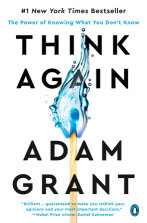
Intelligence is traditionally viewed as the ability to think and learn. Yet in a turbulent world, there’s another set of cognitive skills that might matter more: the ability to rethink and unlearn.
But recent studies point to a different explanation: it’s not so much changing your answer that improves your score as considering whether you should change it. We
revise their answers. Part of the problem is cognitive laziness. Some psychologists point out that we’re mental misers: we often prefer the ease of hanging on to old views over the difficulty of grappling with new ones. Yet there are also deeper forces behind our resistance to rethinking. Questioning ourselves makes the world more unpredictable. It requires us to admit that the facts may have changed, that what was once right may now be wrong. Reconsidering something we believe deeply can threaten our identities, making it feel as if we’re losing a part of ourselves.
Rethinking isn’t a struggle in every part of our lives. When it comes to our possessions, we update with fervor. We refresh our wardrobes when they go out of style and renovate our kitchens when they’re no longer in vogue. When it comes to our knowledge and opinions, though, we tend to stick to our guns. Psychologists call this seizing and freezing. We favor the comfort of conviction over the discomfort of doubt, and we let our beliefs get brittle long before our bones. We laugh at people who still use Windows 95, yet we still cling to opinions that we formed in 1995. We listen to views that make us feel good, instead of ideas that make us think hard. At
situation, and doesn’t realize the threat until it’s too late.
